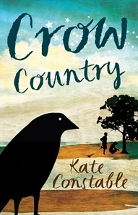Crow country by Kate Constable

Allen and Unwin, 2011. ISBN 9781742373959.
(Ages 12+) Highly recommended. Crime, racism. When a valley
near the town of Boort in northern Victoria was flooded to make a
dam, secrets were buried under the water, but now, with 10 years of
drought, things have been uncovered. The secret is revealed by the
crows of the area to newcomer, Sadie, lately moved to Boort with her
mother, who remembers the place from her holidays as a child. But
Sadie finds the crows talk to her, they direct her feet to the place
where the secret lies buried, and when they are about, she time
slips, returning to the 1930's when her great grandparents owned a
shop in the town's main street. Here she learns of the three mates
who fought together on the Western Front during WW1, vowing to keep
together when they return home. But one is black, and the resultant
racism leads to his death.
The landowner, Mortlock wants to inundate his land, but Jimmy knows
the land to be special to the local people and so objects. Sadie, in
a different time, sees what happens and how her family is involved.
The crows tell her that only she can discover and reveal this secret
to give it peace.
This is an amazingly complex story, not only are there brushes
with problems of rural Australia, drought, use of water, lack of
jobs, the slow demise of rural communities, but Constable has
included racism in a way that provokes thought and discussion. The
theme of racism is an integral part of the whole, neither overstated
or muted but a distinctive and major element of the story.
Sadie's relationship with the Aboriginal boy, Walter, and the
resultant racism aimed at her, is masterfully told, as is the
relationship of her mother and her old flame. The racism that
existed three generations before might have been buried but has
never gone away. Alongside this stunning story, we see Sadie's
developing maturity, of making her own way in the world, of making
up her own mind in the narrow confines of a small country town.
This is an evocative story of modern Australia, linked with the
past. WW1, the depression of the 1930's, land rights and the
treatment of Aboriginal people, particularly those who fought for
Australia and returned home unheralded, all mix to make a story well
worth the read, both as a class text and a book to read for
leisure. Teacher
notes are available on Allen and Unwin's
website.
Fran Knight